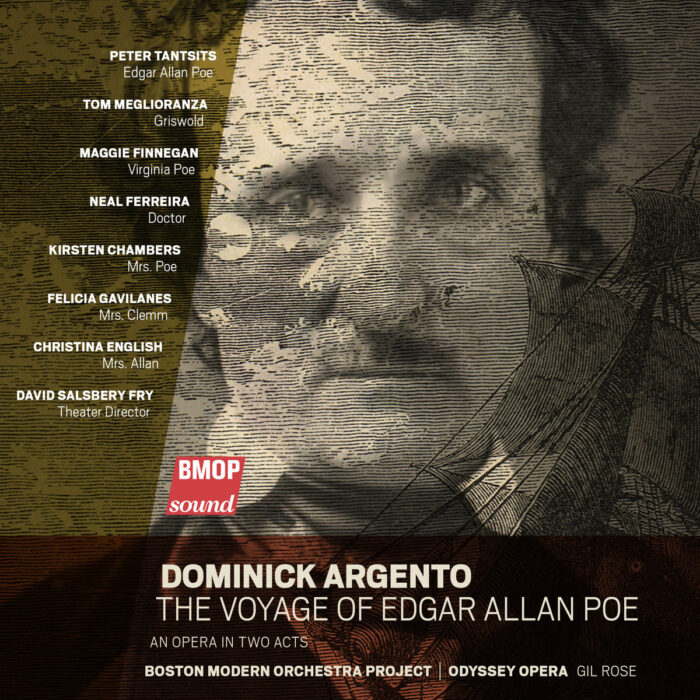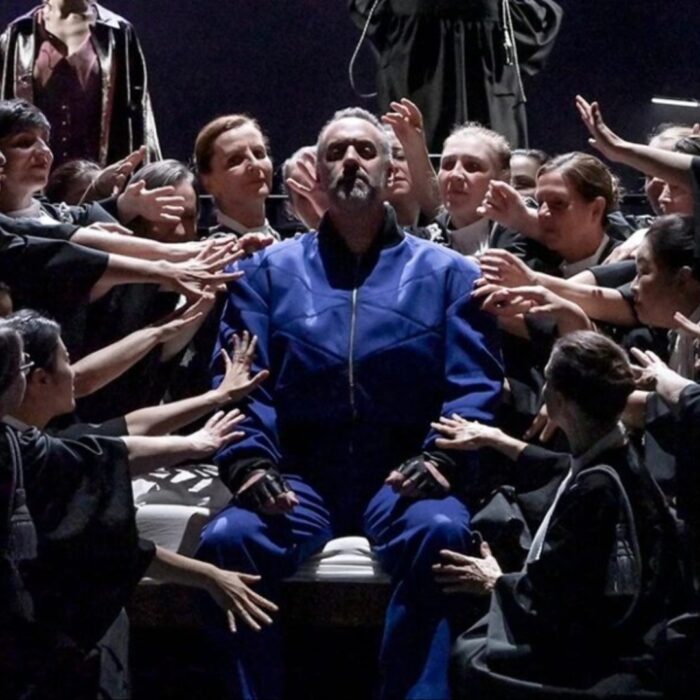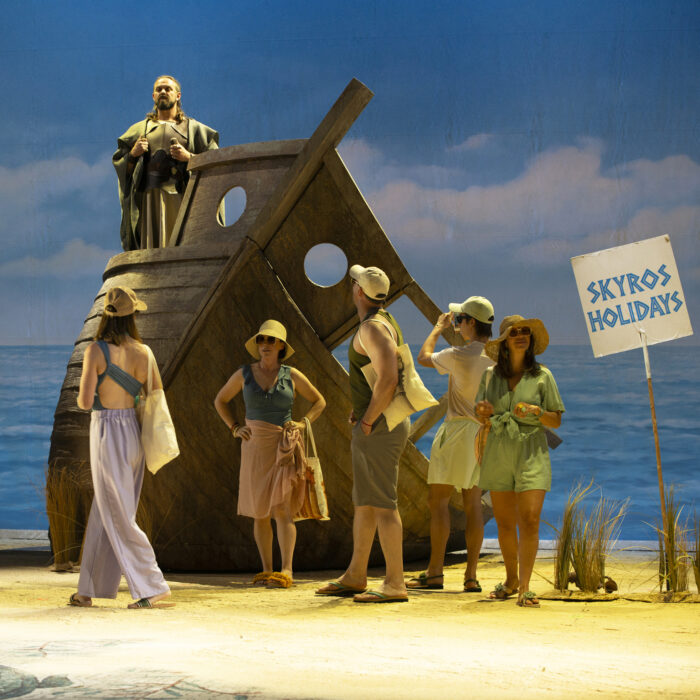Bayreuth Festival 2025: Die Meistersinger von Nürnberg
By Vincent Lombardo(Photo credit: ©Enrico Nawrath)
“My friend, that’s exactly the poet’s job:
to make notes of his dreams – and then interpret them.”
Hans Sachs, Act III
A great mistake is often made in considering Wagner’s operas as complicated. Rather, they are dense, psychological investigations directly confronting archetype personages, be they gods, myths, or members of the family of man. When we reconsider the course of action of a Wagner opera, it is quite common to be succinct with ourselves, as it is also true that the essential storylines are well drawn-out and put to the front. As so in classical Greek drama, in Wagner’s model we often have the Aristotelian structure of three acts – exposition, confrontation, resolution. Within this is the idea of a trilogy. Almost all is limited to monologues, duets, and trios offering dramatic tension that adheres to a moving, often timeless mythical tale, or to the then current social entanglements. Yet, and especially so with such great dramatists as Wagner, the true essence of what we witness on the stage relates to an even simpler truth: an individual’s struggles with society’s rules, this possibly being a harbinger of tragic proportions. But then there is “Die Meistersinger von Nürnberg,” justly considered a comedy, even though truly there is little to laugh about. It indeed anticipates Realism, and is somewhat Chekhovian in its depiction of the sadness of life. One may not believe that Beckmesser is making a fool of himself in the song competition, or find it amusing that a timid Walther is scared to death of being refused as a Meistersinger or as a lover. The historical Hans Sachs, poet and cobbler, is the most complex figure of all, overcoming his self-doubts while holding his society as sacred, imposing rules bestowed through a mind embracing classical values.
Beneath the workings of the words and music in Wagner’s operas, it is Art that will save the world. In itself, “Die Meistersinger von Nürnberg” may be the Wagner opera that is least understood with regard to the composer’s subtle intentions. He did write this ‘comedy’ after “Tristan und Isolde,” while still struggling to finish his “Ring Cycle.” While there is truth that he had hoped that a ‘popular’ opera would help both his image and financial situation, we know that he deeply loved the artistic figure of the historical Hans Sachs and understood his importance to society. Wagner even went beyond his own expectations. In 1862, five years before completing the score, he wrote to his benefactor and admirer Mathilde Wesendonck, ‘…this work will be my most perfect masterpiece… and I will indeed complete it.’ Indeed, yes. His libretto is all in rhyme(!), creating an intricate tapestry of medieval life, much under the influence of Martin Luther, Sach’s contemporary. This link to Protestantism has been the cause of great misunderstanding regarding the final message of “Die Meistersinger von Nürnberg,” calling for the citizens of Nuremberg to honor the Meistersingers, thus retaining their Holy German Art even if the Holy Roman Empire would dissolve into mist. This is not quite pure Nationalism as is so often superficially thought. Rather, it is a reference to the medieval Hans Sach’s Reformation tract; a wonderful prophecy of the papacy about how things will go for it up until the end of the world. Wagner’s Sachs states only that pure Art would spiritually save the Germans, even after the destruction of the world. Wagner sought to praise his fellow Germans, and the whole of the “Die Meistersinger von Nürnberg’s” libretto is a hymn of unification through brotherly love. It was Goethe’s own Faust who stated that ‘…the true Paradise of all people lies at the city’s gate during celebrations, men elite alongside peasants – it is there that I have the courage to feel I am a free man.’
Liberation through Our Dreams
Be there one theme that flows through all of Wagner’s ‘comic’ opera, it is the relationship between our dream images and poetry, and our ability to link the two: this being the liberating factor leading towards artistic creativity. The conscious effort to link the images of our unconscious minds with our waking desires underscores all that is poetic in our lives. Wagner and Shakespeare, in anticipating Freud’s belief that all dreams are a form of wish-fulfillment of repressed desires, sensed that dreams were visions scattered across a fertile field of poetic imagination. The word ‘dream’ is mentioned over 30 times in the opera. All those within the Quintet mention it, and Walther in his Prize Song does so three times. The townsfolk of Nuremberg, mesmerized by Walther’s winning performance, admit they are ‘Lulled as if in most beautiful dream. We hear the song well but scarcely grasp it!’ Music soothes yet remains evasive for many as dreams now in their waking states.
Near the end of the opera, but before the Prize Song competition itself, Sachs gives a name to the melody that Walther intends to perform at the Prize Song ceremony: ‘The blissful interpretation of a morning dream,’ to which Eva begins the all-enveloping hymn of the Quintet, wherein each character mentions the word ‘dream’ in trepidation, only to immediately sense that it is through music that their restlessness may be quelled. At the same time, Wagner bridges generational gaps and social injustice, leading us towards a new reality, one based on tradition. One may believe that this Quintet alone classifies the opera as a masterpiece. Only Beckmesser, the critic of all critics, will not mention the word ‘dream.’ He bungles his attempt to communicate in a creative way with a stolen song which he cannot understand on an artistic level. Walther’s ‘Morgenlich leuchtend im rosigen Schlein… ein Garten lud mich ein…’ (Glowing in the rosy radiance of the morning… a garden invited me…) becomes Beckmesser’s ‘Morgen ich’ (Glowing, I, in the rosy radiance…). Wagner’s play on words becomes an indirect attack against his staunchest critics of the time, yet even here the musical twists and distortions are tinged with tenderness. All is human comedy, and this brings us to the Bayreuth production at hand.
Comedy for Its Own Sake
Given the fact that “Die Meistersinger von Nürnberg” is a most refined ‘exposé’ of character motivation, we will be suddenly brought face to face with surfacing truths from the depths of their unconsciousness. Wagner’s ‘arias’ are pure monologues, and these rank among the greatest in all opera. What is comic, eccentric, or fun-loving must take second place. Yet the stage director, Matthias Davids, has given us a Nuremberg that truly resembles Laurel and Hardy’s film, “Babes in Toyland.” Accepting the production or not, we heard and read such descriptions (whether in praise or criticism) claiming that all becomes a musical laden with kitsch antics, a trash comedy full of gags, burlesque slapstick, and music hall color. This must induce failure as Wagner’s ‘comic’ opera should never become light-hearted entertainment and at the expense of the Nuremberg townsfolk. It is they who Wagner hails, praising them for their bravery in going beyond their fears and incomprehension when facing Art. There is no stadium or rock concert here to attract the masses, but a yearly Prize Song competition with sophisticated rules that they endeavour to understand and follow. They ultimately do reward the merits of Art when they allow for the creation of something new and of value. In this current version, it seems their purpose is to only amuse the audience through continuous slapstick skits of a child-like nature. One example comes to mind, and it was right at the beginning of the second scene of Act One, when we are moved from the square before the cathedral to the street rehearsal space, equipped with seats resembling those of the Festspielhaus itself. A couple shoot out onto the stage, laughing themselves silly; the woman pulls a woolen ski cap over her companion’s head, and their laughter drives them to convulsions. True, this was only a single moment, but when hundreds of these routines portray the lives of the townsfolk in such mono-dimensional exaggeration, we must lose interest and abandon them to their infantile reality.
In a sophisticated way, one may take this directorial interpretation of “Die Meistersinger von Nürnberg” to be in the ‘Pop Art’ vein, related as it is to comic strips – look to the almost-psychedelic primary red, yellow, and blue colors of the final scene. Davids sends messages regarding today’s society but often falls flat by not truly connecting to our own social perplexities. There is a phone booth full of books, suggesting a library, a pot smoker wandering in and out who will appear at opera’s end only to disappear having understood nothing of what is going on during the Prize Song event. A Merkel look-alike somewhat unable to blend in with her citizens. The role of women in society is betrayed by an Eva immersed in flowered hedges for seemingly hours, all wrapped up as an object-present. Now comes a jarring volte-face departure from Wagner’s libretto: Walther, we recall, first refused the chain of the Meistersinger Order, still angered by the Meistersinger’s refusal of his first truly novel song, only to be admonished by Sachs for his ingratitude, whose advises him to accept it, which he does. Here, however, Eva has other ideas. She returns the medal to her father, Pogner – and off into the sunset does the modern couple walk. We are not shocked by this gratuitous gesture in its attempts to demonstrate how strong-willed Eva is. Yet it comes at the wrong time, and makes Sachs and the Meistersingers resemble antiquated, closed-minded fools. A balance is not found between the sacred traditional and brash innovation. Little effect did another trick of Davids have: the huge, inflated cow that crowned the Prize contest stage was unplugged by a sore-loser Beckmesser, and, as all could have predicted, re-inflated by Sachs at opera’s end as the rousing chorus members raise their voices in honor of the cobbler poet who restored order to their town.
Gesture and Ambiance
Apart from the physical layout choices made by the director, one could only have been disappointed by the acting as the characters delved into their roles. True, they were all rather good, and so totally involved that one can only admire their efforts. The challenge lies in the opera Wagner has given us: a philosophical examination of how Art in every form arises from self-analysis, from bravely juxtaposing society’s rules with one’s desire to follow blind instinct into untrodden territory. The monologues are multiple and long and must have stage action to accompany them. These were handled in simple, effective ways – gluing a stool, banging upon shoe soles, throwing love-message paper planes, or even over-exaggerating when six townsfolk take seeming hours to put two tables in place where the jury of the contest will sit.
What failed here, and “Die Meistersinger von Nürnberg” itself presents the problem, is when Sachs has to listen to, digest, and react to what others are saying. One cannot project – actually mime – every nuance of an interior-monologue. It does not read past the first few rows of the audience, and all is lost. Sachs made hundreds of these facial quirks, frowns, and surprised grimaces, telegraphing what we had already understood. Worst of all were Walther’s physical outbursts of confusion and frustration in being misunderstood. He constantly talked to himself in preparing a love discourse. Sadly, Beckmesser was quite the opposite, and nothing of his acid shrewdness came off – he, the experienced marker and record-keeper of other’s errors! He should have also been much older, a ridiculous suitor after a young maiden. His Prize Song was one of the unfunniest ever seen, as also poorly musically accentuated in the interpretation. Beckmesser must take himself all-too-seriously, making his failure even more humiliating and embarrassingly humorous. Tragic must be his discovery of how bad he is, as anyone who has performed in public knows. His anger towards Sachs for putting him in that position is oddly under-played here, and he hardly ever looks towards him again. Lastly, the rousing kermess turned into a street riot scene to end Act Two. The wavering trees and sign-posts, a boxing match between David and Beckmesser, and stools being broken, can only remind us of something already seen in a Rossini opera.
The technical team that followed the director’s preferences kept the performance afloat as best it could. Frankly, the costumes looked like they were rounded up from various old productions and blended together in an attempt at fancifulness. It was not because they did not establish a historical epoch to hold on to, but caused visual confusion in following stage movement, even though groups in the same dress did stick together. The stylized lead roles were better attempts, while the masses – the chorus in modern dress – made little effect. The set was most promising in the first scene, with a towering, narrow staircase leading uphill to the model of a simple, yet austere stone church with a steeple. Many children’s books have similar illustrations, portraying naïve visions of the world. The revolving stage was used to little effect, and a traditional costumed stagehand scene-change before our eyes was here executed by the chorus-townsfolk, leading us mechanically into the final celebrative scene. The lighting did capture our attention, bringing out the best of each scene.
Liberties with Folksong and Leitmotifs
At times through the ever-blossoming score of this opera, the baton of Italian conductor Daniele Gatti weighs down or accelerates in seemingly improvised ways. This is not only somewhat habitual for him, but seems to indicate a current trend: pulling the stops to hold back or accelerate as it pleases a conductor in novel ways, devilishly having us second-guess the exact tempi and markings. The Prelude itself paves the way for an all-too-personal interpretation, yet not without merits. The timing is par to almost all other versions – roughly ten minutes. Odd that no conductor at all ever clocked in with two minutes. The more one knows Wagner and his prestigious interpreters, the less prone they are to willingly follow serenely through this reading. There are ‘holds’ that linger slightly, as if to state that there is another way to conduct a theme. Best with Gatti are his flute’s and oboe’s bird-like warbling, recognizable in his Mahler, bringing us ever closer to Nature. If you know Gatti from those performances, or have heard his “Lulu” (Berg), then you truly appreciate all that is fresh in the phrasing throughout the Prelude. In the richly woven orchestral sections, Gatti seems to distinguish between the brass and strings, giving both equal, yet separate weight. Also, every diminuendo falls into place effortlessly. The mood changes are well paced, and Walther’s Prize Song accompaniment is admirable, imbued with the spirit of Wagner’s love of living for Art. As too, and justly so, is Beckmesser’s odd control over his ‘musicianship’ fragile and insecure. All the monologues were well-paced, offering instrumental surprises in sustaining the text’s subtleties. More crystalline than lightweight, with evidence of Modernism, if you will. A meritorious success.
Dignified Sung Characterizations
As mentioned, the staging asked the performers to use gestures in a somewhat exaggerated manner in an effort, perhaps, to spell out what was going on, to give detail and meaning to every utterance. “Die Meistersinger von Nürnberg” is demanding for performers, and not just for the sheer length of time they appear onstage. Their challenging monologues stand side-by-side in dialogue, and the singers need to sustain credibility and delve into the intricacies of their every-day responsibilities to their society. It is unique that in this opera there is no over-abundance of chaos or dramatic urgency. All is centered about their St. John’s Day celebrations to music and artistic craftmanship. The Hans Sachs of the ubiquitous Georg Zeppenfeld is a tour-de-force. The voice seems deliberately lighter, and ever so ‘cantabile’ through all three acts, underlying the great sensitivity of the simple cobbler. Had the stage director asked for less spelling-out of every emotion and interaction, we would have seen one of the greatest interpretations of this noble, demanding role. Christina Nilsson as Eva, the daughter of the Goldsmith Pogner, offered up as the prize wife to the winner of the Song Contest (should she so desire) truly fit into the role. Her singing encompassed great breadth, and she changed vocally and dramatically, contingent upon the situation. Her youthfulness created tenderness, and her studied musical moments showed the graciousness of one immersed in caring for others. Her opening phrasing in the Quintet offered us the self-assurance of music’s power to soothe the soul.
David (Matthias Stier) and Magdelene (Christa Mayer), the second set of lovers, were perfectly matched, as credible as their stage presence. Both voices were among the best in this production, integral parts of the action and truly worthy of our attention. They, too, were asked to show character depth through their monologues. Jongmin Park’s Pogner was one of regal grandeur, prince-like, responsible for the Meistersinger Prize and his daughter’s destiny. His stage presence and voice were truly Wagnerian. As the hero, young Walther von Stolzing must show us his character’s depth in constant development as a pure, humanistic artist. And this Michael Spyres was able to convey. Certainly the premiere performance, seen by many on the live broadcast, lived up to all expectations. There were touches of innocence in his singing and acting – immaturity, yes, but all linked to honesty of the spirit. His Prize Song, so eloquently laid out, growing in confidence as the music led him on, was indeed worthy of the prize. Sixtus Beckmesser (Michael Nagy) was not ill-cast, yet appeared too young here. He seemed to be the same age as Hans Sachs. Both men held affection for Eva, true, but Sachs bowed out (as did Cyrano) and did all to see that her union with David was fulfilled. Beckmesser instead should appear as a ‘dirty old man,’ vainly removed from reality in his quest for winning her through his ‘artistry.’ His voice, however, was rich, expressive, and all that was in the music of this role arrived to us with dignity – a dignity that even his faults could not remove. Jordan Shanahan as Fritz Kothner, the baker, was an important presence as he has enough to sing, linking characters, observing, and keeping the Prize Competition’s organization under control. His singing was malleable, tonally in character with his role.
Let us mention the remainder of the Nürnberger cast: Martin Koch as Kunz Vogelgesang, Werner Van Mechelen as Konrad Nachtigal, Daniel Jenz as Balthasar Zorn, Matthew Newlin as Ulrich Eisslinger, Gideon Poppe as Augustin Moser, Alexander Grassauer as Hermann Ortel, Tijl Faveyts as Hans Schwarz, Patrick Zielke as Hans Foltz, and Tobias Kehrer as the Night Watchman. The apprentice Meistersingers (Lehrbuben) were Maaike Huppertz, Reba Bernhardt, Lisbeth Rasmussen Juel, Helena Gedda, Seona Kim, Hebe Hamilton, Nadia Steinhardt, Jessica Ouston, Thomas de Bruijn, Paul Skalicki, Tadeusz Slowiak, Chool Seomun, Philipp Fischer, Johannes Lehner, Ruben Olivares, and Ji Yuan Churchill Qiu.
We now give credit to the Bayreuther Festspiele Chorus Master, Thomas Eitler-de Lint, as to every member of that great vocal ensemble. The Festspiele Orchestra infused life into every note of the fertile score. The choreography was by Simon Eichenberger and the dramaturgy cured by Christoph Wagner-Trenkwitz.
Victory for A United Townsfolk
In this “Die Meistersinger von Nürnberg” we may not all have found the stage director’s portrayal of the Nürnberger amusing, nor identified with their exaggerated antics. May we therefore share happiness in other instances, especially when Wagner’s music reveals itself through his leitmotifs, coloring the glories of our own human comedy. Everything takes place in the span of one special day (almost two), wherein we too will recognize ourselves as grappling to accept life’s realities, its challenges, while perhaps also attempting to bring our dreams into our tomorrows.



